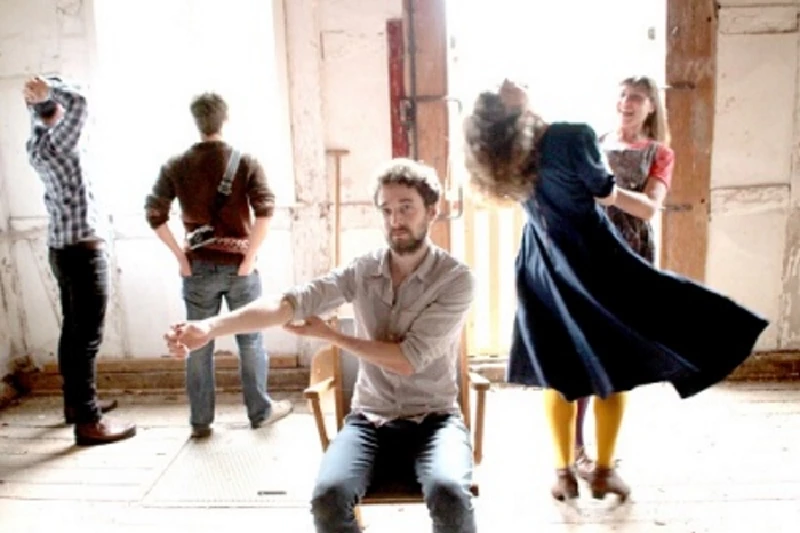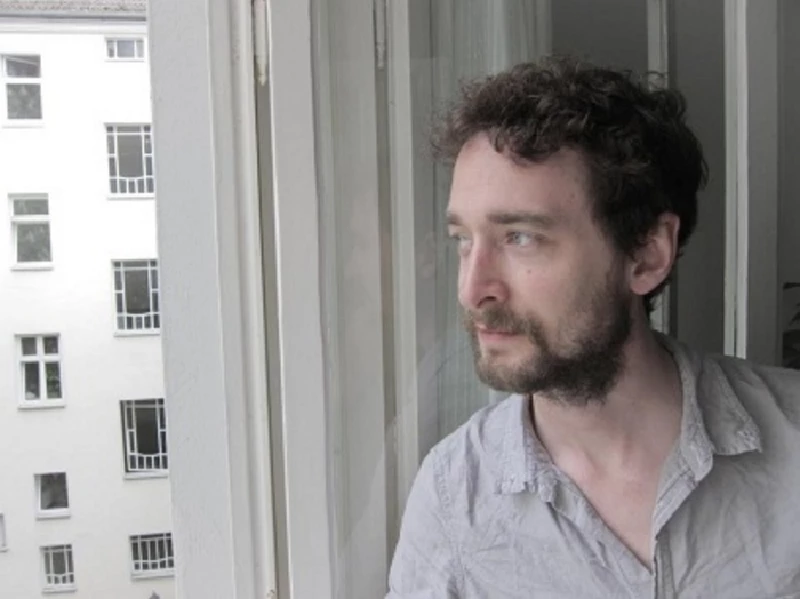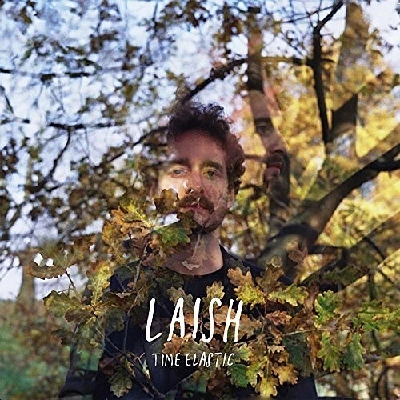Laish - Interview
by Benjamin Howarth
published: 25 / 5 / 2013

intro
Ben Howarth speaks to Daniel Green, the front man with Brighton-based folk pop outfit Laish, about his band's experiences as part of the influential Wilkommen Collective and their just-released second album, 'Obituaries'
I first encountered Laish in 2009, when they were performing as the Laish Quartet on a double-header with then labelmates the Leisure Society. Both bands were members of a collective of Brighton-based bands, the Willkommen Collective. At that time, Laish songs were delicately played with fingerpicked acoustic guitar and minimal accompaniment. In the intervening years, Laish's music has changed considerably since then – with only faint glimmers of their folk origins on their second album, 'Obituaries'. After several line-up changes, what had always been essentially a solo-project has now settled on a five piece line-up. Describing Laish as “a playful, thoughtful and uplifting kind of band,” songwriter Daniel Green packs his songs full of unexpected images and wry humour. 'Obituaries' was written after what must have been a painful break-up, but even when his songs might seem painfully introspective on paper, they are delivered in a warm and uplifting manner that draws you in. Green says that “I've always liked an approach to music where there is humour, but not that is ha-ha funny. I've always been drawn to the sort of humour of Bill Callahan, or to Leonard Cohen, where there is a knowing smile rather than a gag”. I spoke to him at the end of May, shortly after Laish had completed a tour of the UK. Though 'Obituaries' had only been released by Folkwit two months earlier, his thoughts had already turned to his next album. Asked for his plans for the rest of the year, one thing stands out - “Playing the End Of The Road festival – probably the most exciting news I have ever had! A real dream come true. Other than that, the focus is on a new album and a new sound.” I had begun the interview by asking how he felt about 'Obituaries', the album he had still only recently released: DG: I still feel very positive about it. As a songwriter and musician who has been doing this for quite a few years now, I think it is the thing I have put the most heart and soul into and the most time and effort. I think there is a lot more energy to these songs, and they lend themselves to being played live much more than those on the first album. You have to be totally honest as well about what gets you up for playing live, and for me it is definitely the more upbeat songs. PB: How much freedom to you give to the rest of the band to interpret the songs in their own way, or do you have lines that you're not willing to cross? In essence, to what extent are you ultimately in charge? DG: I write all the songs. It's not like I am Billy Corgan or anything, but I inevitability have an idea of where I want the songs to go. But, Martha and Emma both lock in very tightly – they are amazing to watch in rehearsal. They come up with melodies and counter-harmonies, and before you know it, they have written a whole new piece of music around the song that I am not even aware of. At some point, however much you love the way a song was written, you have to realise how exciting other people's ideas can be. PB: I know that when you first started the band, you were part of the Willkommen Collective, and you played with other bands from that group, like Sons of Noel and Adrian. Are the people in Laish now all from that group? DG: Where do you start? I suppose the central hub of the Willkommen Collective is Sons of Noel and Adrian. Three of those people play in Laish – me, Emma and Patrick. Martha played in another band and then joined Laish. Dan came from a different angle, as he played in a band that I don't think would have called themselves part of the collective, but he joined Laish and got to know the people in that scene. It is as much social as it is musical because Brighton is such a small place. PB: Do you still think of yourself as an active part of it? I know that bands like the Leisure Society have moved on to other labels. If pushed, what would you say? DG: I think it was at its most active and noticeable around 2009 to 2011 – the Golden Age of the Willkommen Collective! Then, there were lots more gigs we put on ourselves and things we released. I think all the people involved still make music – but there is less of a collective aspect to it. Also, we started out with a homespun, acoustic, unplugged feel to almost all of the bands. I think we have all moved on to a slightly heavier sound, the kind you would want to play on a bigger stage. Especially Sons of Noel and Adrian, who are getting more and more 'out there', with a progressive rock vibe. PB: Would you describe yourself as folk? DG: I'm really bored of the word folk. You see the bearded guys on stage with acoustic guitars and violins, and I can fully understand why you'd use that term. But, to be honest, the direction we are going is to be as far away from that as possible – we maybe haven't got there yet, but I don't know how much 'Obituaries' sounds like folk. When Willkommen started, there was a real excitement about what could be achieved with just an acoustic guitar, and with home recordings. Now,that has become much more common. It can still be a great thing, but I have reached a point where I just want to do something else. PB: Is it fair to say that it was the point when you met the people who became the Willkommen Collective that sparked your songwriting, and made you want to do it seriously? DG: Yeah, definitely. I had taken a year out and travelled, around India mostly, and it was that time when I reconnected with the music part of me, which had been dormant while I was at university. I had an urge to really throw myself into it, and moving to Brighton – and suddenly being surrounded by so many inspiring songwriters and singers - that definitely had an influence on me, I can't deny it. PB: Do you think if you had not moved to Brighton you'd be doing something completely different, or is that an over-simplification? DG: (Pauses) I think it would be fair to say that Brighton opened up my willingness to be a performer, and to make the songs an actually enjoyable thing. I think I was schooled musically to be deliberately awkward – for a long time I was into some very difficult music, stuff like post-rock, noise and improvised music. Being in Brighton allowed me to say, “Maybe I just want to write a song, sing it and do it well.” Seeing other people who were doing that allowed me to think that I could. PB: What about writing lyrics – it's clear that a lot of thought goes into them. Is that the part of songwriting you most enjoy? DG: I have a stupid amount of books full of words, and it sometimes pains me to think how many songs I would have if I took the time to go through those properly. But, usually, I need to get to a guitar quickly, or I will lose the connection with what the song is all about. I certainly take the songs seriously in that sense, and spend lots of time editing them. But the actual joy comes from taking those songs to the band, and arranging them. ‘Warm the Wind’ is an example of a song that we tried in so many ways, and eventually we reached this weird arrangement that kind of stuck. But it took several months for us to actually feel comfortable playing it from start to finish – just for a four minute pop song! PB: You've recorded at home up to now. Is that what you plan to do in future, or would you want to collaborate with a different producer? DG: I will always do some recording at home, but I would 100% definitely be keen to collaborate with a producer in a studio for the next album. Definitely. I feel like that has got to be the next thing! You have caught me at a fairly transitional point where I have lots of new songs, but I am not decided what to do with them. Even with the band there, I have in many ways approached it as a solo project, and in the studio I have often wanted to be by myself, working things out. That can get overwhelming and tiresome. I just need to find the right person. PB: Is that your main ambition? What else would you really like to achieve, with this album and perhaps the next one? DG: Basically, I want to be able to do this full-time. I want to spend solid time in a studio working with someone, because a label will release it, a booking agent will book me a tour and someone will sort my shit out! Everyone who is remotely serious about music wants to be in that position, and it’s not there yet, but I want to be in a position where there is a momentum that doesn't require me to write every email to achieve it. I think this year feels like a time where lots of things are changing, with people that I know – it's been inspiring and I feel like I need to ride that wave. PB: Thank you.
Band Links:-
https://www.facebook.com/laishmusic/https://twitter.com/LAISHmusic
https://www.songkick.com/artists/1779711-laish
https://www.youtube.com/user/Laishmusic
https://plus.google.com/u/0/+Laishmusic
https://laishmusic.com/
Picture Gallery:-


soundcloud
reviews |
|
Time Elastic (2018) |

|
| Mildly impressive second album from Laish that in the end is too mild-mannered for its own good |
most viewed articles
current edition
Carl Ewens - David Bowie 1964 to 1982 On Track: Every Album, Every SongArmory Show - Interview with Richard Jobson
John McKay - Interview
Colin Blunstone - Thalia Hall, Chicago, 16/7/2025
Billie Eilish - O2 Arena, London, 10/7/2025
Bathers - Photoscapes 1
Visor Fest - Valencia, Spain, 26/9/2025...27/9/2025
Loft - Interview
Sir Tim Rice - Interview
Robert Forster - Interview
previous editions
Manic Street Preachers - (Gig of a Lifetime) Millennium Stadium, Cardiff, December 1999Heavenly - P.U.N.K. Girl EP
Beautiful South - Ten Songs That Made Me Love...
Oasis - Oasis, Earl's Court, London, 1995
Peter Perrett - In Dreams Begin Responsibilities Interview Part One
Boomtown Rats - Ten Songs That Made Me Love....
Coldplay - Wembley Arena. London, 16/8/2022
Prolapse - Interview
Pixies - Ten Songs That Made Me Love...
Trudie Myerscough-Harris - Interview
most viewed reviews
current edition
Davey Woodward - Mumbo in the JumboSick Man of Europe - The Sick Man of Europe
Lucy Spraggan - Other Sides of the Moon
Amy Macdonald - Is This What You've Been Waiting For?
Phew, Erika Kobayashi,, Dieter Moebius - Radium Girls
Bush - I Beat Loneliness
Suzanne Vega - Flying With Angels
Alice Cooper - The Revenge of Alice Cooper
Cynthia Erivo - I Forgive You
Blueboy - 2
Pennyblackmusic Regular Contributors
Adrian Janes
Amanda J. Window
Andrew Twambley
Anthony Dhanendran
Benjamin Howarth
Cila Warncke
Daniel Cressey
Darren Aston
Dastardly
Dave Goodwin
Denzil Watson
Dominic B. Simpson
Eoghan Lyng
Fiona Hutchings
Harry Sherriff
Helen Tipping
Jamie Rowland
John Clarkson
Julie Cruickshank
Kimberly Bright
Lisa Torem
Maarten Schiethart